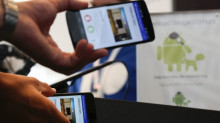Microsoft Patch Tuesday thwarts nosey malware
Cyberattackers curious about the contents of users' hard drives will now have a tougher time finding that information, thanks to a new patch that Microsoft issued Tuesday in the latest round of "Patch Tuesday" bug fixes.
This iteration of Patch Tuesday fixes, which Microsoft releases on the second Tuesday of each month, was a relatively small one for the company, said Amol Sarwate, director of vulnerability research at IT research firm Qualys. This edition contains four bulletins covering 42 vulnerabilities.













































































